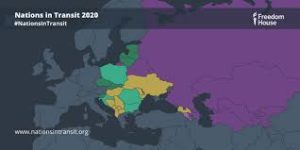
Freedom House
Hungary was the first democratic victim of the coronavirus. It may not be the last, Boise State’s Steven Feldstein writes for Foreign Policy.
China’s foreign policy has increasingly weakened democratic institutions in at least 20 countries throughout Central Europe and Central Asia, weakening oversight and bolstering the power of authoritarian leaders, a new U.S. think tank report said Wednesday. According to Freedom House, the ruling Chinese Communist Party’s (CCP) influence campaign is focused on the twin goals of expanding China’s influence abroad and promoting a positive image of the country globally, RFA’s Joshua Lipes reports.
“While China’s international engagement is often less directly confrontational … it nevertheless has an insidious effect on the development and functioning of democratic institutions in the region,” Washington-based Freedom House said in its Nations in Transit 2020, an annual report on democratic governance in 29 countries spanning Central Europe, the Balkans, and Eurasia.
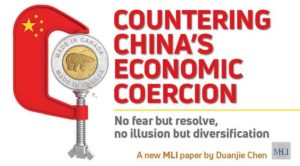 China’s diplomatic corps “tailors its approach to each individual country,” the report adds, exploiting institutional weaknesses and “surreptitiously embedding itself into corrupt political and economic structures.”
China’s diplomatic corps “tailors its approach to each individual country,” the report adds, exploiting institutional weaknesses and “surreptitiously embedding itself into corrupt political and economic structures.”
“The aggregate impact of these measures is the further degradation of good governance, transparency, and the rule of law, and the creation of additional avenues for predatory, local political elites to remain in power and further bend the system to their advantage,” it said.
In particular, Freedom House highlighted China’s focus on technology and surveillance, noting that Chinese tech giant Huawei has signed a “Safe City Agreement” with governments in 10 of Nations in Transit’s 29 countries—each of which suffers from poor governance and serious corruption, Lipes adds.
China’s action in the region place its sharp power in sharp focus, notes one observer.
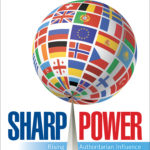
National Endowment for Democracy (NED)
The Chinese PR campaign hit some potholes: warnings about Chinese organized procurement practices came in the Czech Republic. Spain, Poland, Hungary, and the Czechs reported faulty, Chinese-made test kits. But overall the Chinese strategy appears to be paying off, chiefly because of perceived European Union disarray and divisions, adds CEPA analyst Zsombor Zeöld.
The West needs to look at Chinese actions as a whole, and not just its individual elements, he adds. China has a strategic culture. Western policymakers both fail to grasp this, and lack one of their own. RTWT
@lucinadimeco, the author of #ShePersisted. Women, Politics & Power in the New Media World, explains Why Disinformation Targeting Women Undermines Democratic Institutions, for the NED’s International Forum @thinkdemocracy
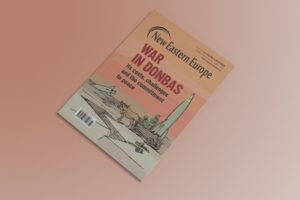
Eurozine
New Eastern Europe explains the Stalinization of Russia’s historical propaganda, Eurozine reports.
The conflict between Russia and Poland over responsibility for the outbreak of the War that flared up at the end of 2019, and which was reignited in February 2020 at the Yad Vashem World Holocaust Forum, signal ‘a new level of aggression in Russian historical propaganda’, says Ernest Wyciszkiewicz. So why is Poland in particular now being targeted? Wyciszkiewicz cites three reasons:
- First, because of the Polish government’s ‘de-communization of public space’ since 2018, which has involved the removal of Red Army monuments – a sacrilege in the eyes of Russia.
- Second, because Poland has become a frontrunner in countering Russian disinformation in the European Union.
- And third, because Russia is seeking to exploit what it sees as Poland’s weakness in its conflicts with the rest of the EU.
The Fight for Freedom in Post-WWII Central and Eastern Europe

Henry Jackson Society
The victory over Nazi Germany in 1945 was and remains an important milestone in European and world history. While most of Europe celebrate Victory in Europe Day on May 8, the Kremlin continues to put forward a distorted narrative that underplays the hardships the Soviet Union inflicted on its neighbors. The Kremlin’s modern-day narrative around WWII denies the historical reality of these countries’ decades-long struggle for freedom, notes CEPA.
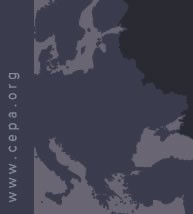 Join CEPA – a partner of the National Endowment for Democracy (NED) – and the Lithuanian, Polish, and Ukrainian Ambassadors to the United States for a discussion on Russia’s exploitation of WWII history, how the West can counter these narratives, and the significant strides former Soviet countries have made to overcome past oppression and contemporary false narratives to create a better future.
Join CEPA – a partner of the National Endowment for Democracy (NED) – and the Lithuanian, Polish, and Ukrainian Ambassadors to the United States for a discussion on Russia’s exploitation of WWII history, how the West can counter these narratives, and the significant strides former Soviet countries have made to overcome past oppression and contemporary false narratives to create a better future.
May 8, 2020 11:15 AM in Eastern Time (US and Canada) RSVP

New Eastern Europe







